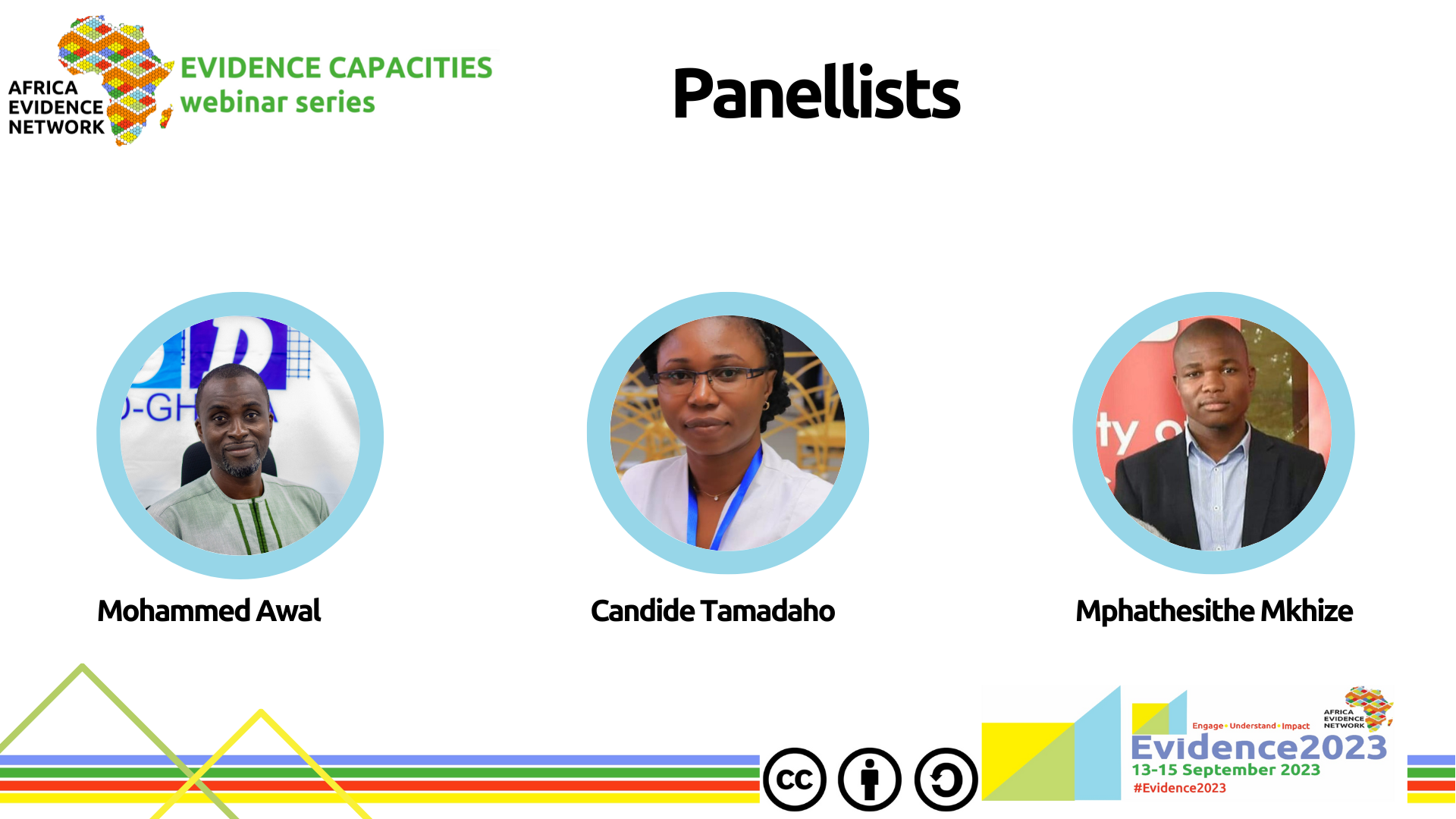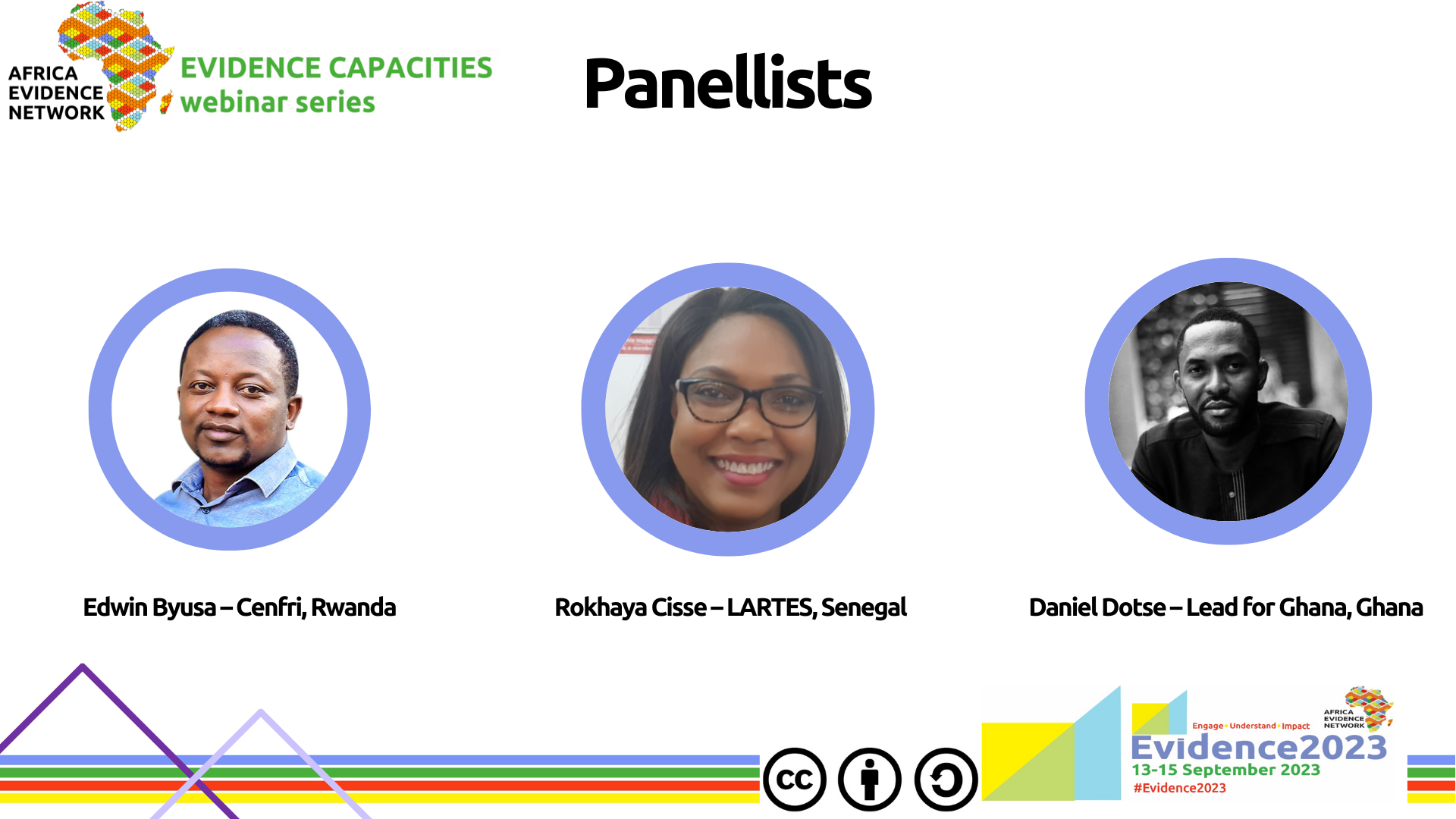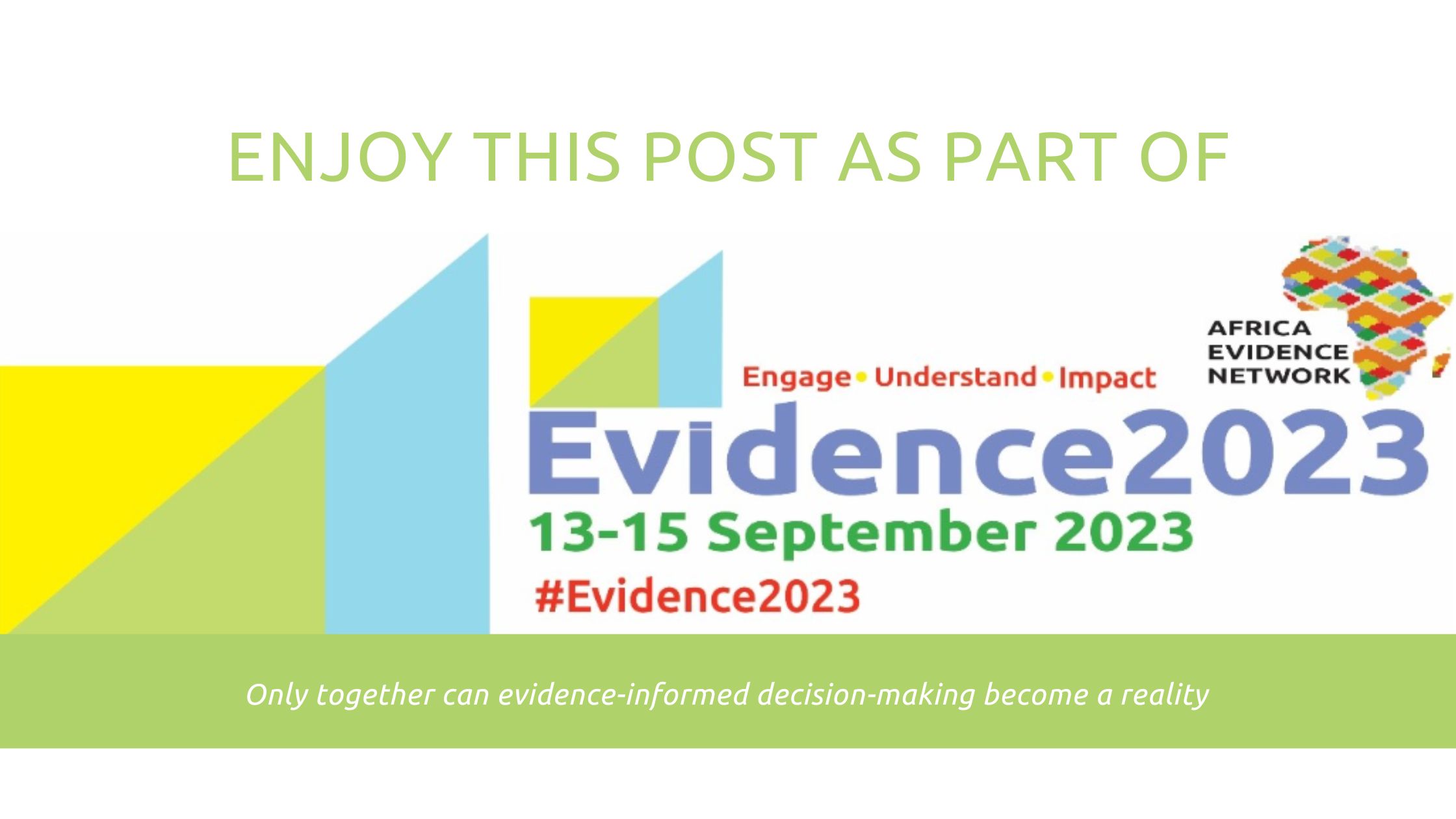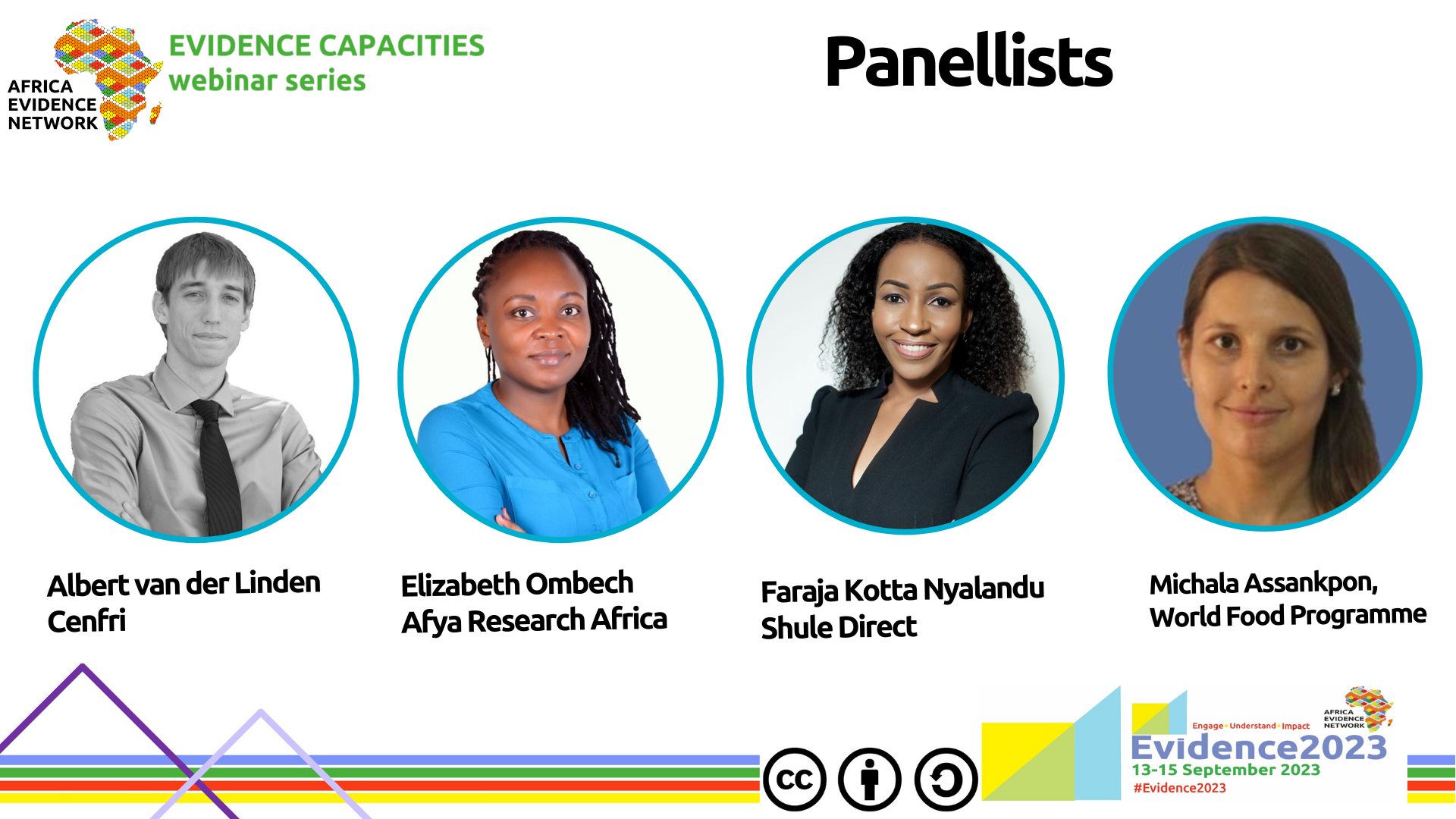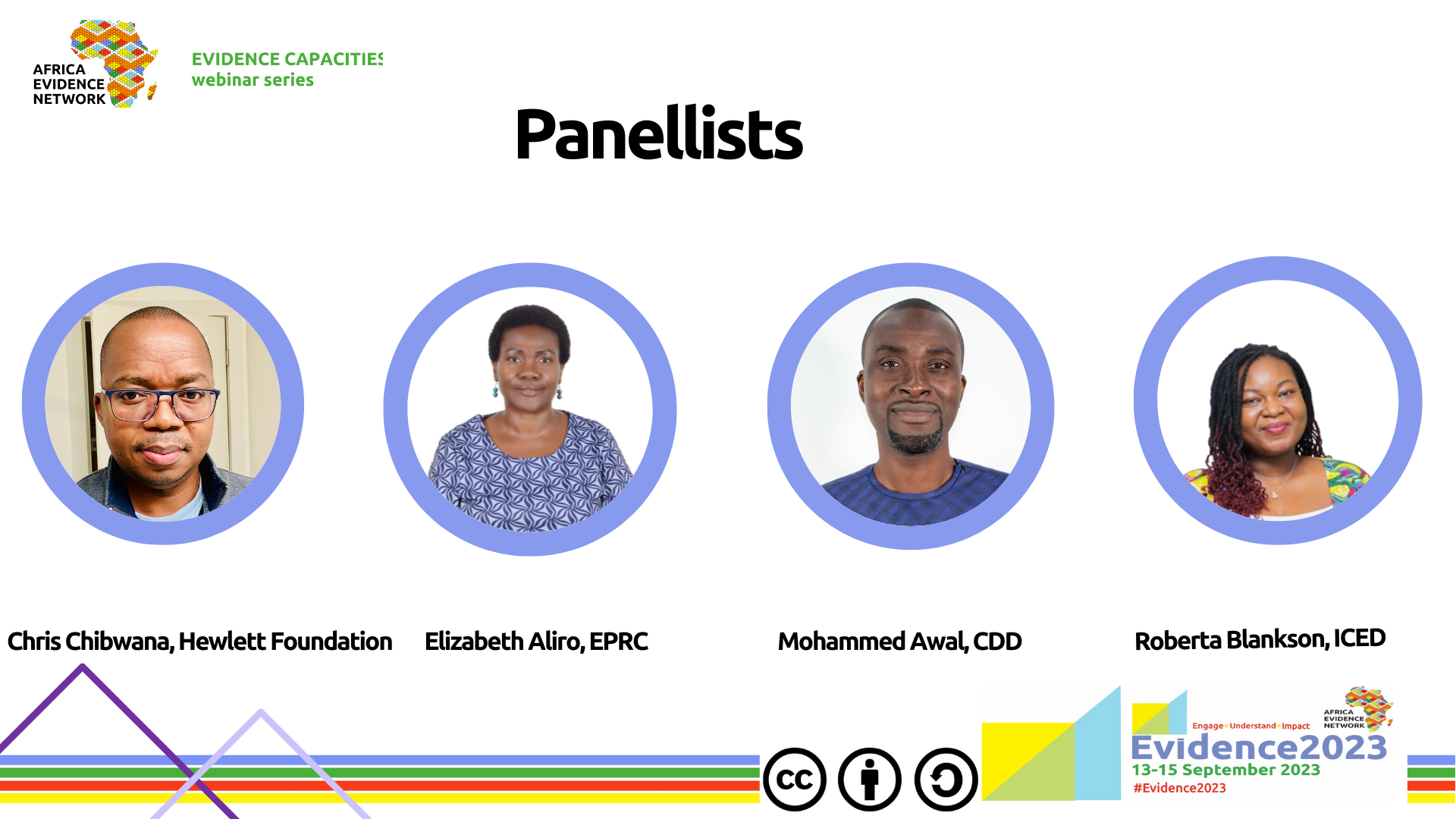Photo Credit: Africa Evidence Network
If you are interested in this topic, read more in the blog post on Utafiti Sera, or review the case studies of eBASE Africa or the rural farmers in Niger and the Botswana Open University.
Introduction
The Evidence 2023: Making Connections and Collaborations workstream supported connections between individuals and organisations working in the evidence-informed decision-making (EIDM) space, with a focus on enhancing the social networks of existing and new members within the Africa Evidence Network (AEN) community. The workstream organised a session where participants discussed innovative ways of working together in EIDM across the continent at the Evidence 2023 event in Entebbe, Uganda from 13 to 15 September 2023. Delegates discussed how linkages between various EIDM ecosystem actors have been exploited to enhance EIDM practice in distinct cases from Botswana, Cameroon, Kenya, and Niger. Interestingly, the speakers represented crucial development sectors in Africa namely agriculture, education, health, and governance. The session demonstrated how collaborations can address issues of coloniality, gender, diversity, equity, and inclusion through what different organisations are doing to support EIDM in Africa.
Empowerment of Indigenous Farmers in Niger through Social Capital
Farmers in Niger are addressing issues such rising agricultural market prices of agricultural inputs, low producer prices, access to financing, and markets by utilising their social capital. Farmers can now easily transport their produce, negotiate for profitable producer prices, expand their markets, buy inputs at reasonable prices, and increase productivity through mutual learning thanks to community organisation and cooperation among various actors along the agricultural value chain. These solutions resulted from working together to exchange information and advance EIDM through a variety of experiences, pooled resources, and a deeper degree of comprehension.
These collaborations are typified by institutional and individual actors with antecedent structural linkages, such as different farmer groups, champions, and community leaders functioning as self-assured authority who are widely recognised by everyone. These players join forces with specific goals in mind and define problems based on shared passions, for example, collaborative practice on sales and price negotiation processes. They recruit partners that share their aims, commitment and have a clear knowledge of the advantages the relationship will bring. Strong sponsors who provide official authority, like charitable benefactors, are examples of such partners. Mutual understanding, respect, and trust are the foundations of these partnerships, and leaders provide catalytic, facilitative, and integrative leadership that inspires confidence and encourages stakeholders to contribute to the collaborative process. All of these factors eventually imply that the governance decision-making procedures, processes, and structures are directed by contextualised evidence and market data, which is characterised by accepted local norms and expressly established rules of engagement.
eBASE Africa: Using Storytelling to Collaboratively Propel the EIDM Agenda
The EIDM framework from eBASE Africa employs a distinctive systematised storytelling technique. eBASE Africa proactively collaborates with researchers, practitioners, non-literates, and policy makers. This EIDM ecosystem is linked to larger global evidence communities, enabling the actors to access freely available evidence resources, such as those from the Africa Evidence Network, Cochrane, Campbell, Joanna Briggs, Guidelines International Network, and Education Evidence Network, among others.
Co-creating, co-designing, and co-implementing programmes lead to community participation and encourage systematisation and ownership of initiatives by stakeholders cooperating at multiple levels. During the co-creation and co-design phase, eBASE Africa works with critical stakeholders to validate an intended intervention and choose expected results through key informant interviews, focus groups, and stakeholder engagement workshops. Collaboration throughout implementation occurs through stakeholder meetings and feedback.
Active engagement in establishing links and collaborations with external regional and international donors and partners supplements these relationships at the local and national levels. At a global level, eBASE Africa has developed solid relationships with partners that have grown to be important allies and financial backers of the work done at eBASE Africa. Examples include, among others, the World Bank, the Gates Foundation, the BHP Foundation, the Wakka Foundation, CEDIL, and the Education Endowment Foundation. eBASE Africa has been able to improve both its own capabilities and the capacities of several governments in Central Africa through the use of complementary networks and funding sources.
Inclusion of Marginalised Communities in Botswana Higher Education
Through a collaborative and consultative process important partners at the grassroots level, including other stakeholders from inside and beyond the education environment, the Botswana Open University (BOU) reaches out to the most marginalised groups. The partners are diverse and even comprise remote, marginalised rural communities, students, employees, government agencies, such as the Ministry of Education and Skills Development, the regulatory body, the Botswana Qualifications Authority (BQA), the Human Resource Development Council (HRDC), civil society organisations, and community-based organisations that serve out-of-school youth and adults from both rural and urban areas. Evidence gathered from internal and external partners, as well as from related policy frameworks and agreements made with international organisations like the AU, UN, UNESCO, UNICEF, SADC, and various communities of practice like the African Council of Distance Education (ACDE) and Distance Education Association of Southern Africa (DEASA), all have an impact on the changes or educational reforms. Informed by evidence from the local people and their diverse circumstances, including external stakeholders, BOU is responsive to the country's higher education needs and also generates policy relevant evidence. Through a democratic higher education policy, a culture of consultative engagements across the entire nation for strong buy-in and participation, including a strong internally-oriented approach of listening and policy implementation based on the wishes of the average people, these connections and collaborations in the EIDM ecosystem have encouraged the growth of open and distance learning over the years.
Utafiti Sera: A Community-driven Research-to-policy Intervention
The complexity of the policy-making process and the paucity of meaningful interactions between researchers, policy practitioners, and other crucial players like citizens are two of the factors that motivated the Partnership for African Social and Governance Research (PASGR) to develop the 'Utafiti Sera' approach. The term translates to "research policy". It is a unique method that entails collaborating with stakeholders in the research-to-policy ecosystem. The framework creates, supports, and improves communities of researchers and policy actors cooperating to enhance evidence-informed decision-making (EIDM). The communities strive to ensure collectively negotiated knowledge development and evidence-to-policy actions that take place through participatory programmes, including legislative processes, policy dialogues, and other types of civic acts to rigorously synthesise existing evidence and promote its uptake in decision-making.
Utafiti Sera offers a forum for debate and conversation aimed at closing the gap between research evidence and policy. Through political economy analysis (PEA), which evaluates and synthesises the available evidence and knowledge about a specific policy issue, it establishes communities of practice to support the growth of a culture of evidence-informed policymaking throughout Africa. It also identifies knowledge and policy gaps and actors on various fronts. Subject matter researchers, experts, policymakers, and other significant stakeholders are a few examples of these actors. Analysis of these actors' motivations and capabilities, as well as their current power dynamics and their policy influence capacities and tactics, are all part of the analysis process.
The important stakeholders are invited to meetings at the "Utafiti Sera House" by PASGR based on the mapping study. In order to improve the uptake of research evidence, the notion envisions a location, venue, or space where information and experiences can be exchanged and where resources, support, and facilitation are provided. Repeatedly the process builds non-partisan communities of practice and spaces for significant stakeholders with the interest, influence, capability, and drive to enhance policy design and implementation.
Conclusion
One key takeaway from this session is that collaborative approaches enable the creation of locally appropriate solutions that address local objectives and support local stewardship. Collaboration necessitates accepting complexity, unpredictability, and a diversity of approaches, in contrast to bureaucracies who tend to favour more uniform approaches that can be measured by consistent and comparable impact measurements. However, it is crucial to recognise that imposing a uniform framework for collaboration without taking into account regional conditions and ambitions is not sustainable. The session further highlighted the significance of acquired cultural values and a learnt set of skills for establishing and maintaining strong connections and collaborative relationships. Collaborations also provide safe spaces for engagement to manage power dynamics. These factors can all be connected to the emotional resonance of systems, stakeholder relationships, and the expertise that each person or group brings to the collaboration. Therefore, partnerships have enormous potential to enhance knowledge of current EIDM capabilities and ongoing advances throughout Africa. With the knowledge gained from eBASE Africa, Utafitti Sera, BOU, and Niger farmers, it is safe to say that collaborating and establishing connections at local and global levels opens up countless opportunities and advantages, propelling the EIDM agenda from local to global scenes and developing sustainable impact. Most importantly, connections and collaborations foster diversity, equity and inclusion, including decolonising EIDM interventions.
About the author: Ronald Munatsi is the Director of the Zimbabwe Evidence Informed Policy Network (ZeipNET). ZeipNET works to interface evidence and policy through evidence synthesis initiatives, including institutional capacity building focusing on the interface between research and policy with an emphasis on strengthening capacities across individual, institutional and systemic levels.
Acknowledgements: The author(s) is solely responsible for the content of this article, including all errors or omissions; acknowledgements do not imply endorsement of the content. The author is grateful to Charity Chisoro for her guidance in the preparation and finalisation of this article as well as her editorial support.
Disclaimer: The views expressed in published blog posts, as well as any errors or omissions, are the sole responsibility of the author/s and do not represent the views of the Africa Evidence Network, its secretariat, advisory or reference groups, or its funders; nor does it imply endorsement by the afore-mentioned parties.
Suggested citation: Munatsi, R. (2023) The Veracity of Afro-centric Approaches in Fostering Connections and Collaborations in Enhancing EIDM in Africa. Blog posting on 20 September 2023. Available at: https://www.africaevidencenetwork.org/en/learning-space/article/314/
